In any SHTF situation, it is important to know how to maximize the resources at your disposal. With a little knowledge and creativity, you can greatly expand the number of uses a particular item has.
Take salt, for example. Everyone who wants to be prepared when SHTF should have an abundant supply of salt in their homes since it has so many practical uses that would greatly benefit such a scenario. That also makes salt a perfect bartering item.
Uses for Food
The main purpose of salt for most people is to add a bit more taste to their food. However, salt can be so much more useful in the kitchen thanks to the many applications it has.
* Prevent the browning of fruits and vegetables. Food storage is one of the main concerns for people preparing themselves for a disaster. Every new technique that preserves food under conditions where electricity is no longer available is welcomed. Salt can be used to stop fruits and veggies from browning. Normally, this is something that can be done with lemon juice or vinegar, but a bucket of salty water will also do the trick.
* Preserve food naturally for long term survival. Salt works by dehydrating the food as well as the microbes present in the food. This way the microbes are prevented from contributing to decomposition. Most especially, mold and yeast cannot grow in food pretreated with salt. Food preserved this way could last for years.
* Fresh egg test. There is a simple way of telling whether an egg is good to eat or not using salt. All you need is a cup of water with two teaspoons of salt in them. If you drop an egg in the cup, a fresh one should sink straight to the bottom while an older one would float. An older egg has more buoyancy because the air cell inside of it increases. However, this does not necessarily mean the egg is bad. You still have to crack it and smell for any foul odors to see if it is truly rotten.
* Make cheese last longer. Another food which has an increased lifespan by using salt is cheese. Even when it is preserved properly in a refrigerated environment, cheese will inevitable spoil due to mold. This cannot be prevented with salt, but it can be delayed. All that is necessary is to wrap the cheese before storing it in a damp cloth moistened using saltwater.
* Put out grease fires. When cooking, a grease fire is one of the most dangerous things that can happen. It can overcome the entire kitchen in just a few moments and, eventually, the entire home. One thing to never do is to throw water on top of a grease fire. The water evaporates instantly and spreads the fire all over the room. Instead, throwing salt on top of the grease fire will create a crusty layer without oxygen, thus smothering the flames. Moreover, the salt also acts as a heat sink, dissipating the heat.
Personal Care Uses
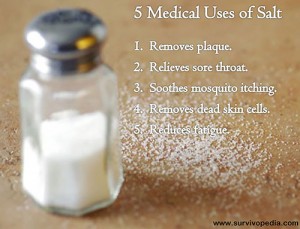
* Get rid of itchiness. Salt can be used for bee stings, mosquito stings, poison ivy and any other types of problems that cause rashes and itchy skin. The salt will not reduce inflation and will not make the rashes disappear, but it will cool down the skin and get rid of that itchy sensation. What you need to do is apply a cloth which has been soaked in saltwater to act as a compress. Alternatively, you can also dampen the affected area and simply apply a handful of salt to it. For the latter, it is important to make sure there are no open wounds. Applying salt in this case would be really painful.
* Treat mouth problems. Any kind of sores in the mouth such as abscesses and cankers can be dealt with using salt. What you need to do is to rinse your mouth several times a day using warm water with a little salt in it. It will help deal with the pain, but make sure not to put too much salt in it.
* Provide tooth care. When resources are scarce, salt can also be used to look after your teeth. First of all, it can be used to extend the life of a toothbrush by simply soaking it in saltwater. Furthermore, a very efficient solution can be made by combining one part of fine salt with two parts of baking soda. This mixture can be used on a toothbrush to act as a toothpaste replacement. It can also be mixed with water and used as a rinsing solution.
Home Care Uses
Looking after your home is important whether SHTF or not. Salt can be used as a replacement for a surprisingly large amount of products. Their purposes are very diverse, but they do have one thing in common – they all benefit the home.
* Prevent ant invasions. If a home is suffering from ant intruders, salt can be of use as long as you know where the ants are entering from. A simple line of salt placed at the doorways or on the window wills is enough to deter the pests. Ants will not cross over the salt.
* Get rid of poison ivy. Another invader which can be dealt with using salt is poison ivy. For this, you will need a mixture of salt and soapy water – about three pounds mixed with one gallon should be enough. This mixture should be sprayed on the leaves and stems of the ivy. However, you need to be careful to avoid the plants that you do not wish to kill.
* Get rid of stains. Salt can be used to get rid of a wide array of tough and stubborn stains. All you need to do in this situation is to soak the fabrics with the stains in cold saltwater. This works for clothes, but also for carpets, drapes and rugs. It should be able to remove blood, sweat, wine, ketchup etc. It can also be used to get rid of certain unpleasant odors from clothes.
* Clean around the house. There are a large number of common items which can be cleaned using various solutions containing salt. For starters, refrigerators can be cleaned using a simple mix of salt and soda water instead of using chemicals. Cast-iron pans with grease on them are also easy to clean by sprinkling salt on them and then using paper towels. Wooden tables can be cleaned of glass ring stains using a paste made out of salt and vegetable oil. Sink drains are kept smelling fresh and free of grease deposits by regularly pouring a mixture of hot water and salt down them. Items made of brass and copper can be cleaned using a paste made out of equal parts salt, vinegar and flour.
As you can see, salt has many uses. Therefore, it should be considered an indispensable resource for anyway looking to prepare for an SHTF event.
This article has been written by Bella Scotton for Survivopedia.


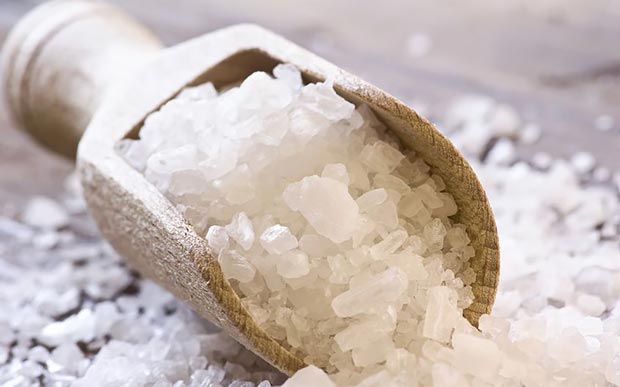

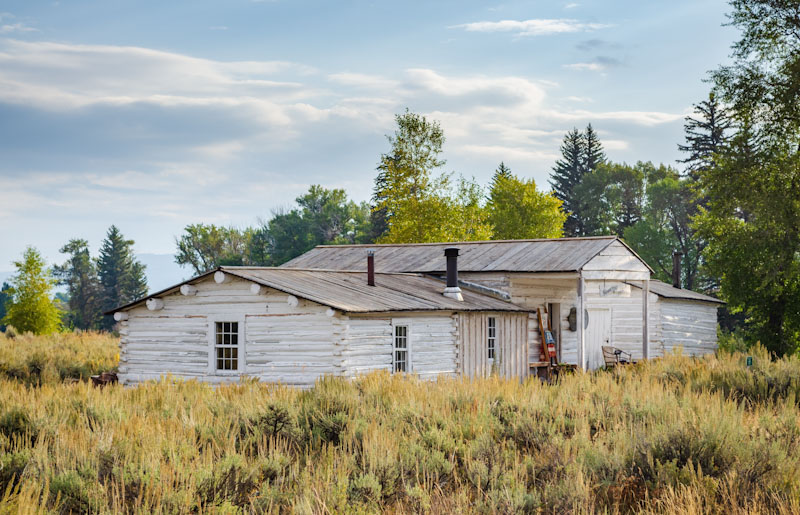
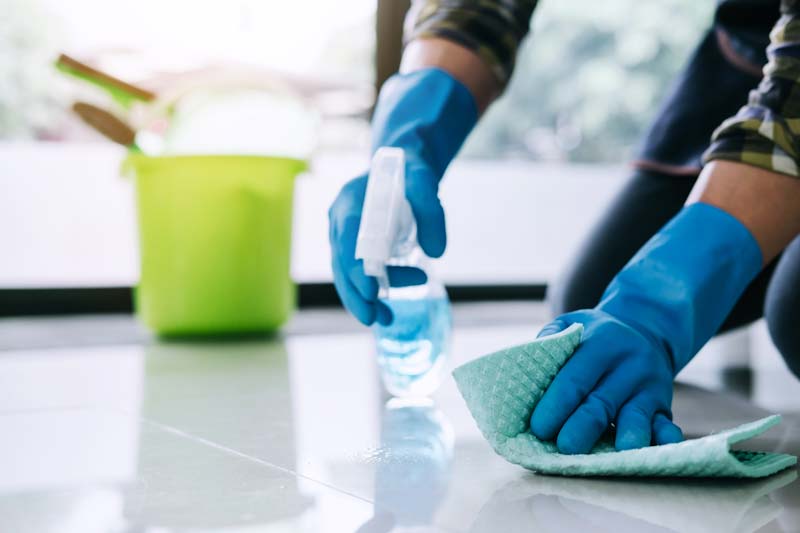
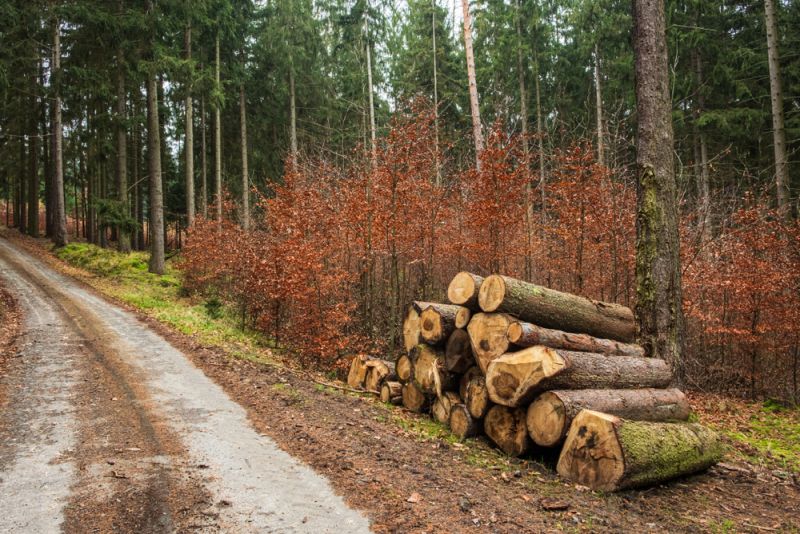


Linda | February 19, 2014
|
Any advice on where to find SALT after the shelves are bare?
Ive heard dried stinging nettles ground down can suffice as a substitute for using with food but wouldn’t know where or how to find a salt deposit.
…~*~…
admin | February 19, 2014
|
Dear Linda, there are natural ways to collect salt from the nature. Read here some tips> http://www.survivopedia.com/prep-blog-review-5/
Linda | February 19, 2014
|
Thanks
…~*~…
Pingback:Uses of Salt for Survival | TheSurvivalPlaceBlog | February 20, 2014
|
Pingback:Uses of Salt for Survival | February 20, 2014
|
Jay B | February 21, 2014
|
I have wanted to stockpile some salt and was wondering if the large bags of water softener salt is safe for food / consumption?
Chris | November 1, 2018
|
It is NOT FOOD GRADE, that is why it isn’t supposed to be in your cold water/ DRINKING side of your plumbing. However, there are some manufacturers out there that do put out a 99.8% pure salt ( best way to confirm is let some dissolve and see how many impurities arise ie: clay, shell debris, dust debris etc.) So this being said… it CAN be used if it is states it purity. DEFINATLY do not use the pellets as it has additives.
Muriel | February 21, 2014
|
If you have problems with your laundry looking dingy, chances are it’s caused by your hard water. Grandma used to take care of the problem by tossing a handful of salt into the wash water.
Pingback:Multipurpose Items: Uses of Salt for Survival | SHTF R U Ready? | March 7, 2014
|
Sarah | April 2, 2014
|
Dave in Idaho Concerning the wheat you are storing Feed wheat is just that. The qltiuay/grade of wheat is lower, so it is used to feed animals. Many times it has shriveled kernels due to being frozen or rained on. For human consumption,(making bread, etc.) store and use #1 hard red spring wheat or white spring wheat. The higher the grade number on wheat the lesser the qltiuay. We have hard red spring wheat that has been stored for 30 years in buckets and it makes very good bread.
Pingback:8 Multipurpose Items to Use for Off-Grid Survival | SurvivoPedia | August 28, 2014
|
Great Grey | March 31, 2015
|
For the non food uses of salt go to feed store and buy the fine grain livestock/calf salt it is much cheaper. One place I just looked at has 50# for $3.99 your local cost will very. Also rock salt works but will take longer to dissolve and for some uses, such as ice-cream making that is good.
meg patton | October 23, 2015
|
Is there a good use for potassium chloride? My water softener died from a lightning strike and was a problem anyway with a salt bridge. But it is potassium, not sodium.
Pingback:This It The Easy Way To Make Ink At Home | | disasterdefense.us | April 25, 2016
|
Pingback:8 Natural Remedies For Gingivitis | NewZSentinel | June 26, 2016
|
Pingback:3 Remedies From Medieval Europe To Heal The Common Cold | Survivopedia | December 8, 2017
|
Neil | January 25, 2018
|
You could always buy a still and distill ocean water. Two fold deal. Clean water and salt by product.